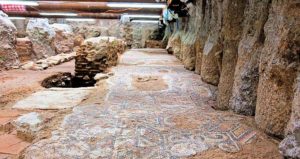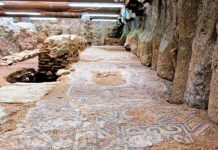Μία ακόμη επιστολή προς τον Έλληνα Πρωθυπουργό για την σωτηρία και την κατά χώραν διατήρηση των εξαιρετικά σημαντικών αρχαιολογικών ευρημάτων, στο σταθμό Ελ Βενιζέλος της Θεσσαλονίκη, χωρίς να παρεμποδίζεται η λειτουργία του μετρό, έστειλαν 165 προσωπικότητες της αρχαιολογίας ξένων πανεπιστημίων και διεθνών φορέων:
Προς τον πρόεδρο της Ελληνικής Κυβέρνησης
κ. Κυριάκο Μητσοτάκη
Ως Έλληνες της διασποράς, φιλέλληνες και μελετητές του αρχαίου και βυζαντινού πολιτισμού, εκφράζουμε την απογοήτευσή μας για τις πρόσφατες εξελίξεις που θέτουν σε κίνδυνο τα σημαντικά ευρήματα της υστερορωμαϊκής και βυζαντινής Θεσσαλονίκης, τα οποία ήρθαν στο φως κατά την κατασκευή του μετρό της πόλης.
Συγκαταλέγονται στα εντυπωσιακότερα ευρήματα αυτών των περιόδων, οπουδήποτε στον κόσμο, από την εποχή που η αρχαιολογία αναδύθηκε ως σύγχρονο επιστημονικό αντικείμενο.

Η σχεδόν άθικτη οδική αρτηρία που ανακαλύφθηκε είναι η καρδιά της πρωτεύουσας της Ύστερης Αρχαιότητας και δεύτερης σε σημασία πόλης του Βυζαντίου, όπως διαμορφώθηκε από τον 4ο έως τον 12ο αιώνα. Δεν είναι γνωστό από οπουδήποτε αλλού κάτι ανάλογης σπουδαιότητας, ούτε σε εδαφική και χρονική έκταση, ούτε σε σημασία για τον αστικό ιστό μιας πόλης.
Είναι τέτοια η σπουδαιότητα αυτού του ευρήματος που η πόλη της Θεσσαλονίκης να μπορεί να διεκδικήσει την ιδιότητα του εξαιρετικού χώρου παγκόσμιας κληρονομιάς της ΟΥΝΕΣΚΟ (ως η μεγαλύτερη και καλύτερα διατηρημένη πόλη που σώζεται από την ύστερη αρχαιότητα και τη βυζαντινή περίοδο οπουδήποτε στον κόσμο) και να αναπτυχθεί ως τουριστικός προορισμός πρώτης τάξεως.
Αν και η διατήρηση του αρχαιολογικού συγκροτήματος της Βενιζέλου στη θέση του είναι και πρέπουσα και τεχνολογικά εφικτή, η κατασκευαστική εταιρεία του μετρό προτιμά να το αποσυναρμολογήσει σε κομμάτια, να τα μεταφέρει προσωρινά σε αποθήκη εκτός της πόλης και να τα ανατοποθετήσει μετά το κατασκευή του σταθμού.
Αυτή η διαδικασία και καταστρέφει τα υποκείμενα αρχαιολογικά στρώματα και εκθέτει τα ευρήματα σε κίνδυνο· επιπλέον, έχει αποδειχθεί αποτυχημένη στην πράξη.
Ευρήματα εξαιρετικής σημασίας της ίδιας περιόδου στον σταθμό κοντά στην πλατεία της Αγίας Σοφίας αποσυναρμολογήθηκαν και μεταφέρθηκαν σε αποθήκη έξω από την πόλη. Ωστόσο, η προσπάθεια επαναφοράς τους στην αρχική τους θέση μετά την ολοκλήρωση των έργων του μετρό ήταν ανεπιτυχής, καθώς δεν μπορούσαν πλέον να χωρέσουν στον χώρο από τον οποίο είχαν εξαχθεί.
Αυτή η διαδικασία απειλεί την αυθεντικότητα αυτού του μοναδικού συγκροτήματος μνημείων, κάτι που αποτελεί ένα από τα κριτήρια της UNESCO για την απονομή του χαρακτηρισμού «Χώρος Παγκόσμιας Κληρονομιάς».
Για τους παραπάνω λόγους, ελληνικά πολιτιστικά ιδρύματα κινήθηκε δικαστικά προκειμένου να αποτρέψουν την καταστροφή. Η υπόθεση κρίθηκε πρόσφατα από το Συμβούλιο της Επικρατείας που αποφάσισε, με οριακή πλειοψηφία μιας ψήφου (13-12) ότι δεν είναι παράνομο να αποσυναρμολογηθούν τα ευρήματα του σταθμού Βενιζέλου προκειμένου να ολοκληρωθεί γρήγορα η κατασκευή.
Αυτή η απόφαση έδωσε προτεραιότητα στη γρήγορη λύση παρά στη διατήρηση των αρχαιολογικών ευρημάτων στη θέση τους. Η διαφορά μίας ψήφου δείχνει ξεκάθαρα ότι δεν είναι σαφές τι προσφέρει μεγαλύτερα πλεονεκτήματα.

- Πιστεύουμε ότι η διατήρηση των αρχαιοτήτων στην αρχική τους θέση και συνάδει με την υποχρέωση του ελληνικού κράτους να διαφυλάσσει την πολιτιστική κληρονομιά – στην περίπτωση αυτή πρόκειται για πολιτιστική κληρονομιά όχι μόνο ελληνικών αλλά πανευρωπαϊκών και παγκοσμίων διαστάσεων – αλλά και είναι τελικά η πιο ευεργετική.
Όσον αφορά το τουριστικό, οικονομικό, πολιτιστικό και υπαρξιακό μέλλον της Θεσσαλονίκης, η διατήρηση των αρχαιοτήτων στην αρχική τους θέση είναι η μόνη σωστή λύση.
Τα ευρήματα της Θεσσαλονίκης πρέπει να χαιρετισθούν ως μια άνευ προηγουμένου ευκαιρία να τιμηθούν και να αναδειχθούν οι δυνατότητες της σύγχρονης ελληνικής αρχαιολογίας και τεχνολογίας.
Αντ᾿ αυτού, η διατήρησή τους επί τόπου παρουσιάζεται ως μια πολυτέλεια που δεν μπορεί να αντέξει το ελληνικό κράτος.
Σε συνδυασμό με τα 15 μνημεία που έχουν ήδη χαρακτηριστεί μνημεία παγκόσμιας κληρονομιάς της ΟΥΝΕΣΚΟ η Θεσσαλονίκη μπορεί να χρησιμοποιήσει τα άνευ προηγουμένου ευρήματα ως βάση κατάρτισης ενός γενικότερου σχεδίου που θα την καταστήσει βασικό τουριστικό προορισμό, εξασφαλίζοντας οικονομική ευημερία. Σας εκλιπαρούμε να παρέμβετε προκειμένου να αποτρέψετε την αποδόμηση αυτής της μοναδικής πολιτιστικής κληρονομιάς και την έκθεσή της σε κίνδυνο.
Στα πλαίσια της βυζαντινής αρχαιολογίας, τα συγκεκριμένα μνημεία είναι τόσο μοναδικά που ο εκτοπισμός ή η καταστροφή τους θα ήταν καταστροφή ισοδύναμη με τον βομβαρδισμό του Παρθενώνα από τον Francesco Morosini το 1687.
- Υπάρχουν εφαρμόσιμα σχέδια που επιτρέπουν στους Θεσσαλονικείς να απολαύσουν τα πλεονεκτήματα του μετρό χωρίς να στερηθούν ένα από τα πιο σημαντικά τεκμήρια της αδιάλειπτης συνέχειας του αστικού βίου στην πόλη τους επί 24 αιώνες. Είναι ώρα αυτά τα σχέδια να υλοποιηθούν.
Οι Υπογραφές
- Panagiotis Agapitos, Professor of Byzantine Literature, University of Cyprus
- Sheila Ager, Professor of Classical Studies; Dean of the Faculty of Arts, University of Waterloo, Canada
- Gianfranco Agosti, Professor of Classical and Late Antique Philology, University of Rome, La Sapienza; Member of the Academy of Europe
- Suzanne Akbari, Professor of Medieval Studies, Institute for Advanced Study, Princeton
- Michael Alram, Director of the Coin Cabinet of the Vienna Museum of Art; Vice President of the Austrian Academy of Sciences
- Dimiter Angelov, Dumbarton Oaks Professor of Byzantine History; Faculty Affiliate of the Department of Classics, Harvard University
- Javier Arce, Professor of Roman Archaeology Emeritus, University of Lille; former Director of the Spanish School of Archaeology in Rome
- Roderick Beaton, Koraes Professor of Modern Greek and Byzantine History, Language and Literature Emeritus, King’s College London; Fellow of the British Academy; Commander of the Order of Honor of the Hellenic Republic
- Roger Bagnall, Professor of Ancient History Emeritus and Leon Levy Director Emeritus, Institute for the Study of the Ancient World/New York University; Member of the American Academy of Arts and Sciences; Member of the American Philosophical Society
- Albrecht Berger, Professor of Byzantine Studies, University of Munich; Editor of the Byzantinische Zeitschrift
- Elena N. Boeck, Professor of History of Art, DePaul University; former Director of Byzantine Studies, Dumbarton Oaks Research Library and Collection
- Glen Bowersock, Professor of Ancient History Emeritus, Institute for Advanced Study, Princeton; Member of the American Academy of Arts and Sciences; Member of the American Philosophical Society; Foreign Member of the National Academy of the Lincei; Doctor honoris causa of the University of Athens; Knight of the Legion of Honor
- Hartwin Brandt, Professor of Ancient History, Otto-Friedrich-University of Bamberg; Corresponding Member of the German Archaeological Institute
- Amelia Brown, Senior Lecturer in Greek History and Language; Chair of the Australian National Committee on Byzantine Studies; University of Queensland
- Peter Brown, Rollins Professor of History Emeritus, Princeton University; Member of the American Academy of Arts and Sciences; Doctor honoris causa of the University of Thessaloniki; Knight of the Order of Arts and Letters
- Leslie Brubaker, Professor of Byzantine Art, University of Birmingham; Director of the Center of Byzantine, Ottoman, and Modern Greek Studies; Chair of the Society for the Promotion of Byzantine Studies
- Christer Bruun, Professor of Classics, University of Toronto
- Dame Averil Cameron, Professor of Late Antique and Byzantine History Emerita, University of Oxford; former Warden of Kable College; Fellow of the British Academy; Dame Commander of the Order of the British Empire
- Jan-Mathieu Carbon, Assistant Professor of Greek History, Department of Classics, Queen’s University, Kingston, Canada
- Annemarie Weyl Carr, University Distinguished Professor of Art History Emerita, Southern Methodist University
- Jean-Michel Carrié, Director of Research in Late Antique History Emeritus, École des Hautes Études en Sciences Sociales; Vice President of the Accademia Storico Giuridica Costantiniana
- Paul Cartledge, A.G. Leventis Professor of Greek Culture, Cambridge University; Member of the British Committee for the Reunification of the Parthenon Marbles; Gold Cross of the Order of Honor of the Hellenic Republic; honorary citizen of Sparta
- Béatrice Caseau, Professor of Byzantine History, University of Paris 1, Panthéon-Sorbonne; Member of the Membre de Institut universitaire de France
- Angelos Chaniotis, Professor of Ancient History and Classics, Institute for Advanced Study, Princeton; Doctor honoris causa of the University of the Thessaloniki; Corresponding Member of the Academy of Athens; Commander of the Order of the Phoenix of the Hellenic Republic
- Kevin Clinton, Professor of Classics Emeritus, Cornell University; Co-President, Board of Trustees, American Research Center in Sofia Foundation
- Victor Cojocaru, Researcher in Ancient History, Romanian Academy of Sciences, Iasi Branch
- Kathleen M. Coleman, James Loeb Professor of the Classics, Harvard University; Fellow of the British Academy; Member of the American Philosophical Society; Corresponding Member of the Bavarian Academy
- Marie-Hélène Congourdeau, Rechearcher in Byzantine Studies Emerita, Centre National de la Recherche Scientifique; Membre of the French Committee for Byzantine Studies
- Joan Breton Connelly, Professor of Classics, New York University
- Bernard Coulie, Professor of Byzantine, Armenian and Georgian Studies, Honorary Rector, Catholic Universuty of Louvain
- Pietro D’Agostino, Postdoctoral Fellow in Byzantine Studies, Catholic University of Louvain
- Muriel Debie, Director of Research in Oriental Christianity, École Pratique des Hautes Études
- Nicholas de Lange, Professor of Hebrew and Jewish Studies Emeritus, University of Cambridge; Fellow of the British Academy; Member of the Academia Europea
- Vincent Déroche, Professor of Byzantine Greek, University of Paris 1 Panthéon-Sorbonne; Director of Studies, École Pratique des Hautes Études
- Pauline Donceel-Voûte, Professor of the Archaeology and History of Art of the Christian East and Byzantium Emerita, Catholic University of Louvain; Member of the Royal Belgian Society of Oriental Studies; Member of the Görres-Gesellschaft zur Pflege der Wissenschaft
- Anne-Marie Doyen, Professor of Classics, Catholic University of Louvain and University of Namour
- John Duffy, Dumbarton Oaks Professor of Byzantine Philology and Literature Emeritus, Harvard University
- Susanna Elm, Sidney H. Ehrman Professor of European History, University of California, Berkeley
- Jaś Elsner, Professor of Late Antique Art, University of Oxford; Visiting Professor of Art and Religion, University of Chicago; Fellow of the British Academy; Foreign Honorary Member of the American Academy for Arts and Sciences; Member of the Max Planck Society
- Andrew Erskine, Professor of Ancient History, University of Edinburgh
- Denis Feissel, Director of Studies, École Pratique des Hautes Études; Corresponding Member of the Académie des Inscriptions et Belles Lettres; Member of the Academia Europea
- Elizabeth Fentress, Visiting Professor of Archaeology, University College, London; Fellow of the Society of Antiquaries; former President of the International Association of Classical Archaeology; gold medal for distinguished archaeological achievement of the Archaeological Institute of America
- Cornell Fleischer, Kanuni Suleyman Professor of Ottman and Modern Turkish Studies, University of Chicago; Member of the American Academy of Arts and Sciences; MacArthur Fellow, Class of 1988
- Christian Förstel, Curator of Greek Manuscripts, Bibliothèque Nationale de France, Paris
- Véronique François, Director of Research in Medieval Mediterranean Archaeology, Centre National de la Recherche Scientifique, University of Provence
- Pierre Fröhlich, Professor of Greek History, Bordeaux Montaigne University
- Takashi Fujii, Associate Professor of Ancient History, Graduate School of Letters, Kyoto University
- Oleg Gabelko, Professor of Ancient History, Russian State University for the Humanities, Moscow
- Vincent Gabrielsen, Professor of Ancient History Emeritus, University of Copenhagen; Member of the Royal Danish Academy
- Thomas W. Gallant, Nicholas Family Endowed Chair in Modern Greek History, Distinguished Professor of History and Archaeology, University of California, San Diego
- Patrick Geary, Mellon Professor of Western Medieval History Emeritus, Institute for Advanced Study, Princeton; Member of the American Academy of Arts and Sciences
- Hans-Joachim Gehrke, Professor of Ancient History Emeritus, University of Freiburg (Breisgau); Former President of the German Archaeological Institute; Member of the Heidelberg Academy of Sciences; Member of the German National Academy of Sciences “Leopoldina”; Foreign Member of the Academy of Athens
- Sharon Gerstel, Professor of Byzantine Art and Archeology, University of California at Los Angeles; George P. Kolovos family Centennial term Chair in Hellenic studies; Commander of the Order of the Phoenix of the Hellenic Republic
- Alex Gottesman, Associate Professor of Greek and Roman Classics, Temple University
- Molly Green, Professor of History and Hellenic Studies; Director of the Program in Hellenic Studies, Princeton University
- Heather Grossman, Faculty, Architecture Department, University of Illinoisat Urbana-Champaign
- Michael Grünbart, Professor of Byzantine Studies, Director of Institute of Byzantine Studies, University of Münster; President of the German National Committee of Byzantine Studies
- Lavinia Grumeza, Researcher in Archaeology, Romanian Academy – Iasi Branch
- Francesco Guizzi, Professor of Greek History and Greek Epigraphy, University of Rome, La Sapienza
- Rudolf Haensch, Professor of Ancient History, University of Munich; Associate Director of the Committee for Ancient History and Epigraphy, German Archaeological Institute
- John Haldon, President of the International Association of Byzantine Studies; Professor of Byzantine History and Hellenic Studies Emeritus, Shelby Cullom Davis ’30 Professor of European History Emeritus, Princeton University; Corresponding Member of the Austrian Academy of Sciences
- Kaja Harter-Uibopuu, Professor for Ancient History, University of Hamburg; Member of the Hamburg Academy of Sciences; Co-Spokesperson of the Cluster of Excellence “Understanding Written Artefacts” (University of Hamburg)
- Yitzhak Hen, Anna and Sam Lopin Professor of History, Hebrew University; Director of the Israel Institute for Advanced Studies
- Olivier Henry, Professor of Ancient History, University of Lyon-2
- Judith Herrin, Professor of Late Antique and Byzantine Studies Emerita, King’s College London; Member of the British Committee for the Reunification of the Parthenon Marbles; Golden Cross of the Order of Honor of the Hellenic Republic
- Tonio Hölscher, Professor of Classical Archaeology Emeritus, University of Heidelberg; Member of the Heidelberg Academy of Sciences; Member of the Academia Scientiarum et Artium Europaea, Salzburg; Member of the Accademia Nazionale dei Lincei; Member of the European Academy
- Bart Janssens, PhD, Department of Greek Studies, Catholic University of Louvain; Publishing Manager in Classics at Brepols International Academic Publishers, Turnhout, Belgium
- Catherine Jolivet-Lévy, Director of Studies in Byzantine Art and Archaeology Emerita, École Pratique des Hautes Études
- Christopher P. Jones, George Martin Lane Professor of the Classics and of History Emeritus, Harvard University; Member of the American Academy of Arts and Sciences; Member of the American Philosophical Society; Foreign member of the Académie des Inscriptions et Belles Lettres
- Mika Kajava, Professor of Greek Language and Literature, University of Helsinki; former Director of the Finnish Institute in Rome
- Ioli Kalavrezou, Dumbarton Oaks Professor of Byzantine Art, Harvard University
- Stathis Kalyvas, Gladstone Professor of Government, University of Oxford; Fellow of the British Academy
- Vrasidas Karalis, Sir Nicholas Laurantus Professor of Modern Greek, University of Sydney
- Edmund Keeley, Charles Barnwell Straut Class of 1923 Professor of English Emeritus, Princeton University; Doctor honoris causa of the University of Athens; Commander of the Order of the Phoenix of the Hellenic Republic
- Yannis Kevrekidis, Bloomberg Distinguished Professor, Chemical and Biomolecular Engineering, Applied Mathematics and Staτιstics, and Medical School, Johns Hopkins University; Professor of Chemical and Biological Engineering, and of Applied and Computational Mathematics, Emeritus, Princeton University; Member, American Academy of Arts and Sciences; Corresponding Member of the Academy of Athens
- Maxim M. Kholod, Associate Professor of Ancient History, St. Petersburg State University
- Young Richard Kim, Associate Professor and Head of Classics and Mediterranean Studies, University of Illinois at Chicago
- Holger Klein, Lisa and Bernard Selz Professor of Medieval Art History, Columbia University
- Michael Koortbojian, Moses Taylor Pyne Professor of Art and Archaeolgy, Princeton University
- Jens-Uwe Krause, Professor of Ancient History, University of Munich
- Christos Kyriakakis, Associate Professor of Electrical and Computer Engineering, University of Southern California
- Anna Lampadaridi, Postdoctoral Researcher in Byzantine Studies in the Research Group ‘Orient-Mediterranean, Byzantine World’, University of Paris 1, Panthéon-Sorbonne
- Thomas W. Laqueur, Helen Fawcett Distinguished Professor of History Emeritus and Professor in the Graduate School, University of California, Berkeley; Member of the American Philosophical Society
- Stephanie Larson, Professor of Classics and Ancient Mediterranean Studies, Bucknell University
- Marc Lauxtermann, Stavros Niarchos Foundation – Bywater and Sotheby Professor in Byzantine and Modern Greek Language and Literature, University of Oxford
- Hartmut Leppin, Professor of Ancient History, University of Frankfurt; Gottfried-Wilhelm-Leibniz Award 2015; Erwin-Stein Award 2019
- Alexander Lingas, Professor of Music, City, University of London; Fellow, European Humanities Research Centre, University of Oxford; Founder and Musical Director, Cappella Romana
- Agnès Lorrain, Researcher in Religious Studies, Fonds de la Recherche Scientifique – FNRS, Catholic University of Louvain
- AnneMarie Luijendijk, Professor of Religion and Head of First College, Princeton University
- Peter Mackridge, Professor of Modern Greek Emeritus, University of Oxford; Doctor honoris causa of the University of Athens
- Paul Magdalino, Professor of Byzantine History Emeritus, University of St Andrews
- Christoph Markschies, President of the Berlin-Brandenburg Academy of Sciences; Professor of Patristic Studies, Humboldt University, Berlin; former President of the Humboldt University, Berlin; Order of Merit of the Federal Republic of Germany
- Thomas F. Mathews, John Langeloth Loeb Professor of the History of Art Emeritus, Institute of Fine Arts, New York University
- Maria Mavroudi, Professor of Byzantine Ηistory, Classics, and Near Eastern Studies, University of California, Berkeley; MacArthur Fellow Class of 2004
- Mark Mazower, Ira D. Wallach Professor of History, Columbia University; Director of the Heyman Center for the Humanities
- Richard McKirahan, Edwin Clarence Norton Professor of Classics and Professor of Philosophy, Pomona College
- Petra Melichar, Editor-in-chief of Byzantinoslavica, Slavonic Institute of the Czech Academy of Sciences, Prague
- Sophie Métivier, Professor of Byzantine History; Director of the School of Doctoral Studies in History, University of Paris 1 Panthéon-Sorbonne
- Takashi Minamikawa, Professor of Ancient History Emeritus, Kyoto University; Professor of History, Bukkyo University, Japan
- Brigitte Mondrain, Director of Studies in Greek and Byzantine Philology, École pratique des Hautes Études
- Dominic Moreau, Associate Professor in Late Antiquity, University of Lille
- Cécile Morrison, Director of Research Emerita, Centre National de la Recherche Scientifique; Member of the Académie des Inscriptions et Belles Lettres
- Ioannis Mylonopoulos, Associate Professor of Ancient Greek Art, Architecture and Archaeology, Columbia University; Director of the Program in Hellenic Studies
- Margaret Mullett, Professor Emerita of Byzantine Studies, Queen’s University Belfast; former Director of Byzantine Studies, Dumbarton Oaks, Harvard University; Officer of the Order of the British Empire
- Greg Nagy, Francis Jones Professor of Greek Literature, Harvard University; Director of the Center for Hellenic Studies; Foreign Member of the Academy of Athens; Commander of the Order of Honor of the Hellenic Republic
- Alexander Nehamas, Edmund N. Carpenter II Class of 1943 Professor in the Humanities, Professor of Philosophy and Comparative Literature, Princeton University; Member of the Academy of Athens; Member of the American Academy of Arts and Sciences; Member of the American Philosophical Society
- Robert S. Nelson, Robert Lehman Professor in the History of Art, Yale University
- Andreas Nicolaïdes, Assistant Professor of Byzantine Art History and Archaeology – Director of the Department of Art History and Archaeology, Aix Marseille Université
- Alexander Nikolov, Professor of Medieval History, Sofia University; Chair of the Bulgarian National Committee of Byzantine Studies
- Ingela Nilsson, Professor of Greek, University of Uppsala; President of the Swedish Committee of Byzantine Studies
- Carlos Noreña, Associate Professor of History, University of California, Berkeley
- Paolo Odorico, Professor of Byzantine Studies Emeritus, École des Hautes Études en Sciences Socialesl Doctor Honoris Causa, Babeş Bolyai Univeristy (Cluj Napoca)
- Robert Ousterhout, Professor of History of Art Emeritus, University of Pennsylvania
- Johannes Pahlitzsch, Professor of Byzantine Studies, University of Mainz
- Bernhard Palme, Professor of Papyrology, University of Vienna; Member of the Austrian Academy of Sciences; Doctor honoris causa of the University of Athens
- Maria Pantelia, Irvine, Professor of Classics, University of California; Director of the Thesaurus Linguae Graecae
- Christos Papadimitriou, Donovan Family Professor of Computer Science, Columbia University; Member of the National Academy of Sciences; Gödel Prize
- Arietta Papaconstantinou, Reader in Ancient History, University of Reading, Associate Member of the Faculty of Oriental Studies, University of Oxford
- Nikolaos Papazarkadas, Nicholas C. Petris Professor of Greek Studies and Professor of Classics, University of California, Berkeley; Director of the Aleshire Center for the Study of Greek Epigraphy
- Herrmann Partzinger, President of the Prussian Cultural Heritage Foundation; President of Europa Nostra; Member of the American Philosophical Society; Honorary Member of the American Academy of Arts and Sciences; Great Cross of Merit with Star of Merit of the Federal Republic of Germany; Member of the Order of Merit of the Federal Republic of Germany; Order of Friendship of the Russian Federation
- Bissera Pentcheva, Professor of Medieval Art, Stanford University
- Ulrike Peter, Director of the Corpus Nummorum, Berlin-Brandenburg Academy of Sciences
- Annick Peters-Custot, Professor of Medieval and Byzantine History, Dean
of the Faculty of Historical Sciences and Archaeology, University of
Nantes; Secretary of the French Committee for Byzantine Studies - Christine Philliou, Associate Professor of History, University of California, Berkeley
- Simone Piazza, Associate Professor for Medieval and Byzantine Art, University of Venice Ca’ Foscari
- Walter Pohl, Professor of Medieval History; Member of the Austrian Academy of Sciences, University of Vienna
- Francisco Pina Polo, Professor of Ancient History, University of Zaragoza; Doctor honoris causa of the University of Budapest
- Sdrjan Pirivatrić, Research Fellow, Institute for Byzantine Studies, University of Belgrade; President of the Serbian Committee on Byzantine Studies
- Jonathan Price, Fred and Hellen Lessing Professor of Ancient History, Tel Aviv University
- Nicholas Purcell, Camden Professor of Ancient History, University of Oxford; Fellow of the British Academy
- Claudia Rapp, Professor of Byzantine Studies, University of Vienna; Fellow of the British Academy; President of the Austrian Association of Byzantine Studies
- Sitta von Reden, Professor of Ancient History, University of Freiburg; Dean of the University College
- Marijana Ricl, Professor of Ancient History, University of Belgrade
- Antonio Rigo, Professor of Byzantine Philology and History of Byzantine Christianity, Ca’Foscari University of Venice; President of the Italian National Committee of Byzantine Studies
- Christian Robin, Director of Research for Ancient Semitic Studies Emeritus, École Pratique des Hautes Études; Knight of the Legion of Honor; Member of the Académie des Inscriptions et Belles Lettres; Commander of the Order of Culture and Arts of the Republic of Yemen
- Felipe Rojas, Associate Professor of Archaeology, Brown University
- Youval Rotman, Professor of History, Chair of the Chaim Rosenberg School of Jewish Studies-Archaeology, Tel Aviv University; Co-editor of the Mediterranean Historical Review
- Denis Rousset, Director of Studies in Greek History, École Pratique des Hautes Études; Corresponding Member of the Académie des Inscriptions et Belles-Lettres
- Catherine Saliou, Professor of Roman History, University of Paris 8 Vincennes Saint-Denis, École Pratique des Hautes Études, University of Paris Sciences and Letters
- Michele Salzman, Professor of Ancient History, University of California, Riverside
- Jacques Schamp, Professor of Classics Emeritus, University of Fribourg (Switzerland)
- Bernd Schneidmüller, Professor of Medieval History, University of Heidelberg; President of the Heidelberg Academy of Sciences
- Christof Schuler, Professor of Ancient History, University of Munich; Director of the Committee for Ancient History and Epigraphy, German Archaeological Institute
- Paul D. Scotton, Professor of Classical Archaeology and Classics, California State University, Long Beach; Co-Director, Lechaion Harbor and Settlement Land Project, Corinthia, Greece
- R.R. Smith, Lincoln Professor of Classical Archaeology and Art, University of Oxford; Fellow of the British Academy
- Claudia Sode, Professor of Byzantine Studies, University of Cologne
- Jean-Pierre Sodini, Professor of Byzantine Art and Archaeology Emeritus, University of Paris 1 Panthéon-Sorbonne; Member of Académie des Inscriptions et Belles Lettres
- Jean-Michel Spieser, Professor of Early Christian and Byzantine Archaeology Emeritus, University of Fribourg
- Ronald Stroud, Klio Distinguished Professor of Classical Languages and Literature Emeritus, University of California, Berkeley; former Dean of the Faculty of Letters
- Guy Stroumsa, Professor of the Study of the Abrahamic Religions Emeritus, University of Oxford; Martin Buber Professor of Comparative Religion Emeritus, Hebrew University of Jerusalem; Member of the Israel Academy of Sciences and Humanities
- Sarah Stroumsa, Alice and Jack Ormut Professor of Arabic Studies Emerita, Hebrew University of Jerusalem; Rector Emerita; Member of the American Philosophical Society
- Alice Mary Talbot, Director of Byzantine Studies Emerita, Dumbarton Oaks Research Library and Collection; former President of the Medieval Academy of America; Doctor honoris causa of the University of St. Andrews
- Andrei Timoti, Associate Professor of Philosophy, University of Bucharest; Chair of the Romanian National Committee on Byzantine Studies
- Voula Tsouna, Professor of Philosophy, University of California, Santa Barbara; President of the Society for Ancient Greek Philosophy; Member of the Board of the European Cultural Center at Delphi
- Pablo Ubierna, Professor of Medieval History and Researcher of Lsate Antique and Byzantine History, University of Buenos Aires; Chair of the Argentinian National Committee on Byzantine Studies
- Catherine Vanderheyde, Associate Professor of Byzantine Art and Archeology, University of Strasbourg and Free University of Brussels
- Peter van Deun, Professor of Byzantine Studies, KU Leuven; President of the Belgian National Committee on Byzantine Studies; Editor in chief of the journal Byzantion
- Peter Van Nuffelen, Professor of Ancient History, University of Ghent
- Gonda Van Steen, Koraes Chair of Modern Greek and Byzantine History, Language and Literature, King’s College London
- Myrto Veikou, Researcher in Byzantine and Greek Studies, Uppsala University
- Frederik J. Vervaet, Associate Professor of Ancient History, The University of Melbourne
- Paolo Vitti, Associate Professor of History of Architecture, University of Notre Dame; Member of the Board of Europa Nostra; PhD University of Thessaloniki; European Union Cultural Heritage Award 2014; European Heritage Award 2015
- Andrew Wallace-Hadrill, Professor of Roman Studies and Director of Research for the Faculty of Classics, University of Cambridge; former Master of Sidney Sussex College, Cambridge; former Director of the British School in Rome; Fellow of the British Academy, Fellow of the Society of Antiquaries; Officer of the Order of the British Empire
- Andrew Wilson, Professor of the Archaeology of the Roman Empire, University of Oxford
- Martin Zimmermann, Professor of Ancient History, University of Munich; Member of the Bavarian Academy of Science












